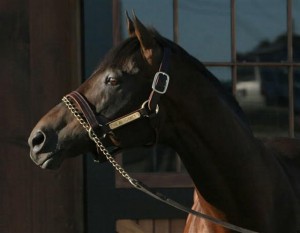It’s springtime. The air is filled with the sweet smell of flowers and fresh starts. But because the first weekend in May is marked by the Kentucky Derby, followed by the Preakness Stakes a couple of weeks later, year after year I find myself struggling to get through this season.
I loathe the Kentucky Derby. Correction: I don’t just loathe the Kentucky Derby. I hate the ENTIRE race horse industry.
But I didn’t always.
In college a somewhat dorky albeit really funny boy invited me to a Kentucky Derby party in Camden, Maine. I shocked all my friends and practically the entire campus when I accepted. It was a chance to put on a pretty dress, get out of the tiny town our school was in and drink Mint Juleps for the day – all while laughing my ass off with this boy.
I sipped on minty bourbon alright and watched in awe as these gallant creatures darted around the track. A horse named Real Quiet won the grand prize, a lush blanket of 554 red roses for him and oodles of money for his owner, but it was the horses that didn’t win that I couldn’t get out of my head. “What about them?” I asked aloud. “They get turned into meat,” my date told me.
Buzzkill.
What I had learned made ME “Real Quiet,” and so we made the two-hour trip back to school in near silence.
That was my first Kentucky Derby party and also my last.
It’s not that I love animals, even though I do. It’s that as far back as when I was a toddler in Nigeria, I was acutely aware of the injustices done to them, and it has always haunted me.
The Kentucky Derby, the Preakness, Belmont Stakes and all of your local thoroughbred race tracks directly contribute to the horse slaughter industry.
Of the racehorse industry, William C. Rhoden wrote the following in the New York Times:
The most significant source of racehorse deaths is the slaughter industry, one driven by overbreeding and demand from the lucrative global meat market. According to the American Society for the Prevention of Cruelty to Animals, more than 100,000 American horses are slaughtered each year in Canada and Mexico to satisfy horse meat markets in Europe and Asia.
Breeding operations produce thousands of so-called surplus thoroughbreds. What happens to the excess, the often anonymous horses? Some are sold to owners who take them overseas. Some wind up racing in Japan. Some wind up in slaughterhouses.
I’d like to point out that thoroughbred race horse, Real Quiet, the same horse that won the Kentucky Derby in 1998 and forever changed my view of this brutal sport, died this past September at age 15. While he didn’t go off to slaughter, he also didn’t retire at pasture. Tired and broken down, he spent the rest of his life as a breeding stallion.

